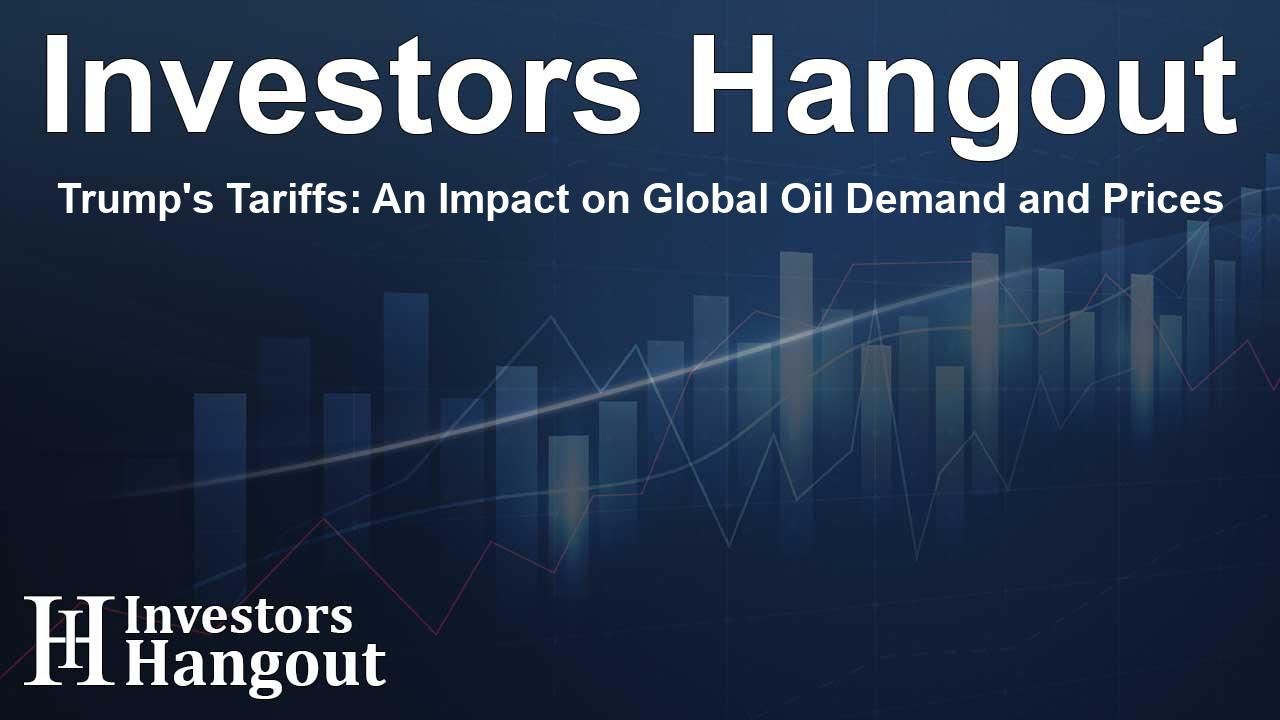Trump's Tariffs: An Impact on Global Oil Demand and Prices

Understanding the Potential Impact of Tariffs on Oil Prices
The ramifications of President-elect Donald Trump's proposals for import tariffs have become a focal point of discussion among analysts in the energy sector. RBC Capital Markets has identified this plan as a potentially significant bearish development for oil prices, raising alarms about its implications for global trade and the energy market.
Trump's Tariff Proposals and Their Scope
As he prepares to enter the White House again, Trump has expressed intentions to enact tariffs that could reach as high as 10% on a variety of global imports, and as much as 60% on goods from China. Furthermore, he plans to introduce a 25% surcharge on products from neighboring countries, Canada and Mexico. Such strategies aim to bolster domestic industries but come with potential risks.
Economic Concerns Raised by Analysts
Economists have signaled that implementing these tariffs may disrupt global trade and lead to inflationary pressures. Analysts are particularly concerned about how these measures might provoke retaliatory responses from affected countries, further complicating the global trade landscape.
Market Reactions and Increasing Uncertainty
The atmosphere in financial markets has echoed this unease, especially following reports regarding Trump's consideration of a national economic emergency to support his tariff initiatives. This has added layers of unpredictability to the market, as stakeholders weigh the potential outcomes.
China's Role as a Major Oil Importer
According to RBC's lead analyst Helima Croft, the imposition of these tariffs, particularly on Chinese imports, could adversely affect demand for crude oil in the world’s largest importing country. Given that China plays a pivotal role in global oil consumption, any decline in demand from this key player could notably influence oil market dynamics.
The Business Community's Perspective
Leaders from the business community, particularly those with established connections to China, may advise Trump against the implementation of severe tariffs. Many anticipate that direct negotiations could yield better outcomes, wherein Beijing may agree to significant purchases of U.S. products, such as aircraft or liquefied natural gas, in exchange for tariff reductions.
Potential Trade-offs with Iran and Tariff Strategies
There's also speculation that China could be prepared to negotiate a reduction of Iranian crude imports in return for concessions on the tariffs, highlighting the intricate web of global trade relations that could influence Trump’s policies.
Future Uncertainties in the Market
Despite predictions, analysts have cautioned that the full effects of these tariffs are challenging to define given the current macroeconomic climate. Unlike previous trade tensions, which experienced limited scope, the broader implications of these proposed policies loom large in the minds of policymakers.
In summary, while the full extent of Trump's tariff plans remains unclear, their potential to disrupt oil demand and pricing hinges on a variety of factors, including international relations and economic stability.
Frequently Asked Questions
How could Trump's tariffs influence oil prices?
Trump's tariffs could lead to reduced demand for oil from countries like China, which may exert downward pressure on oil prices globally.
What are the proposed tariff rates by Trump?
Trump has proposed tariffs of up to 10% on global imports and 60% specifically on Chinese goods, along with a 25% surcharge on imports from Canada and Mexico.
What concerns do economists have regarding the tariffs?
Economists worry that tariffs could disrupt international trade and create inflationary pressures, potentially leading to retaliation from other countries.
How might China respond to these tariffs?
China may seek to negotiate trade-offs with the U.S., such as reducing Iranian crude imports or increasing purchases of U.S. goods, to alleviate the impact of tariffs.
What is the overall market sentiment about the tariffs?
Overall market sentiment is one of caution due to the uncertainties surrounding the potential impact of the tariffs on economic conditions and trade relationships.
About The Author
Contact Logan Wright privately here. Or send an email with ATTN: Logan Wright as the subject to contact@investorshangout.com.
About Investors Hangout
Investors Hangout is a leading online stock forum for financial discussion and learning, offering a wide range of free tools and resources. It draws in traders of all levels, who exchange market knowledge, investigate trading tactics, and keep an eye on industry developments in real time. Featuring financial articles, stock message boards, quotes, charts, company profiles, and live news updates. Through cooperative learning and a wealth of informational resources, it helps users from novices creating their first portfolios to experts honing their techniques. Join Investors Hangout today: https://investorshangout.com/
The content of this article is based on factual, publicly available information and does not represent legal, financial, or investment advice. Investors Hangout does not offer financial advice, and the author is not a licensed financial advisor. Consult a qualified advisor before making any financial or investment decisions based on this article. This article should not be considered advice to purchase, sell, or hold any securities or other investments. If any of the material provided here is inaccurate, please contact us for corrections.
